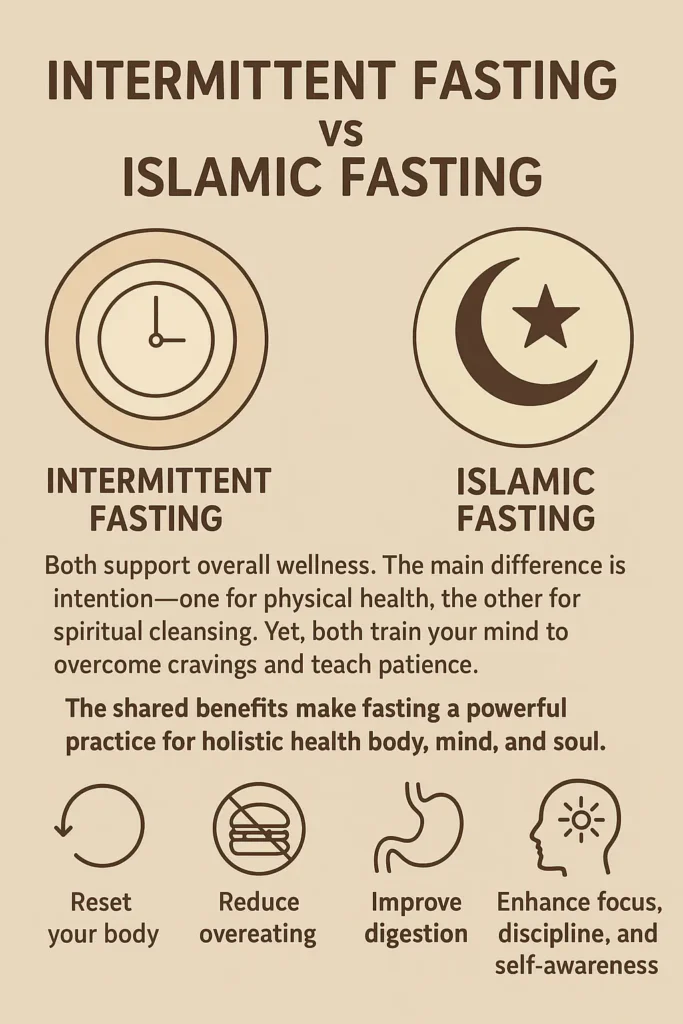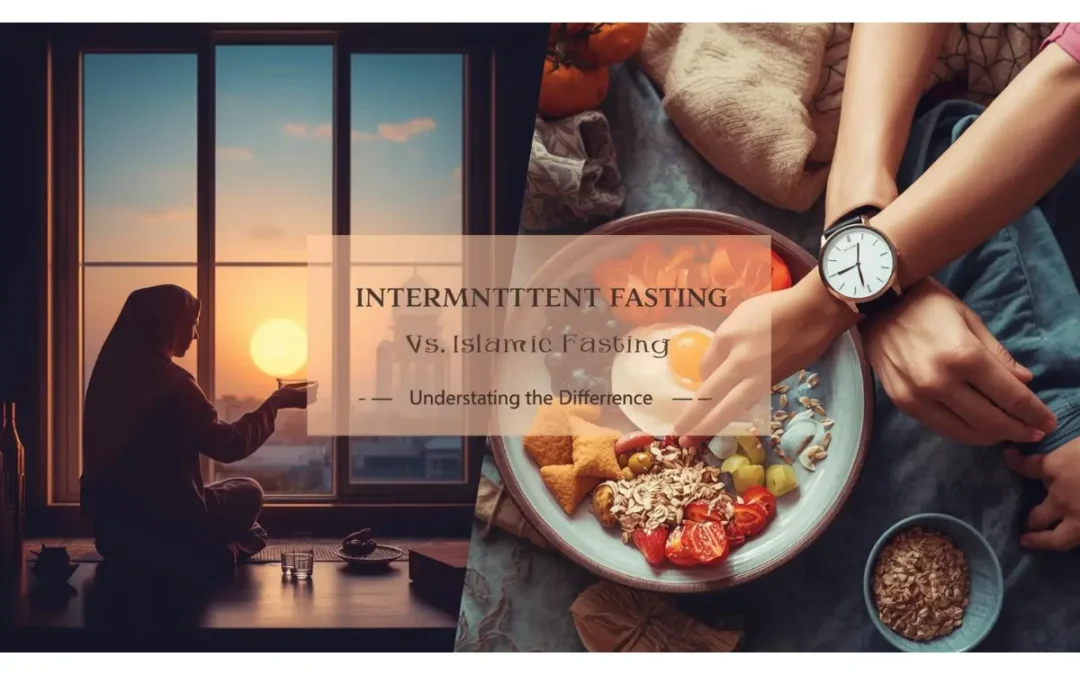Fasting is not just about skipping meals it’s about discipline, purpose, and balance. When we compare intermittent fasting vs Islamic fasting, both share amazing benefits but have completely different goals. Intermittent fasting has become a global trend for fitness and weight loss, while Islamic fasting holds deep spiritual and cultural value. Yet, both fasting types improve health, boost metabolism, and increase self-control. Understanding the difference helps you choose what works best for your body and beliefs.
Many people confuse intermittent fasting with Ramadan fasting, but the two are not the same. Intermittent fasting is a time-restricted eating pattern, while Islamic fasting is a religious act of devotion. The first focuses on metabolism and body weight, and the second focuses on faith and soul purification. Both, however, teach patience and gratitude. Let’s dive deeper into what sets them apart and what they share in common.
Difference Between Intermittent Fasting and Islamic Fasting
1. Fasting Duration and Rules
In intermittent fasting vs Islamic fasting, timing is the biggest difference. Intermittent fasting usually follows patterns like 16:8, 5:2, or alternate-day fasting. This means eating for a few hours and fasting the rest of the day often with water and sometimes even coffee allowed. In contrast, Islamic fasting during Ramadan follows sunrise to sunset, allowing no food or water during daylight hours. This makes it both a spiritual and physical discipline.
Here’s a quick comparison:
| Aspect | Intermittent Fasting | Islamic Fasting (Ramadan) |
| Food/Drink | Water allowed | No food or drink |
| Duration | Flexible (e.g., 16 hours) | Sunrise to sunset |
| Purpose | Health & weight control | Faith & self-control |
| Days | Optional / daily | One lunar month |
| Meals | Anytime in eating window | Only at Suhoor & Iftar |
2. Purpose and Motivation
The motivation behind intermittent fasting vs Islamic fasting defines their true difference. Intermittent fasting is often done for health reasons to lose weight, balance hormones, or improve insulin sensitivity. People choose it to boost energy and metabolism. Islamic fasting, however, is commanded by faith, aiming to strengthen spirituality, empathy, and gratitude toward Allah. The goal is to train the soul, not just the stomach.
Both fasting types build discipline and patience. While one focuses on calorie balance, the other focuses on inner peace and obedience. You may say intermittent fasting benefits your body, and Islamic fasting benefits your soul yet both together can improve your overall lifestyle. The combination of both helps a person stay mindful in eating and living.
3. Health Benefits and Body Reactions

Both types of fasting trigger amazing changes in the body. In intermittent fasting vs Islamic fasting, the body enters a state called autophagy, where old cells are cleaned out, improving immunity and cell renewal. Fasting also reduces inflammation, balances blood sugar, and improves brain function. Intermittent fasting allows water intake, making fat-burning and detox easier. Islamic fasting, though dry, teaches the body to adapt to thirst and hunger naturally.
Studies show that Ramadan fasting can reduce cholesterol, stabilize blood pressure, and improve digestion. Similarly, intermittent fasting helps regulate circadian rhythm and supports healthy weight management. Both lower the risk of chronic diseases and strengthen metabolism. When practiced wisely, fasting is one of the simplest and most natural ways to heal and refresh your body from within.
4. Spiritual and Emotional Impact
Islamic fasting focuses deeply on the spiritual side of life. Muslims fast to obey Allah, practice self-control, and increase empathy for the less fortunate. It teaches patience, gratitude, and the real meaning of sacrifice. Intermittent fasting, on the other hand, is not spiritual but can still promote emotional balance and focus. Many people feel calmer, more productive, and more aware during fasting periods.
In the comparison of intermittent fasting vs Islamic fasting, both strengthen mental discipline. Islamic fasting connects you with your faith, while intermittent fasting connects you with your body’s natural rhythm. Both encourage mindfulness and reduce stress. In a world full of distractions, fasting brings clarity physically, mentally, and spiritually.
5. Nutrition During Eating Windows
What you eat after fasting matters the most. In intermittent fasting, the eating window usually includes high-protein meals, fruits, and balanced macros for energy recovery. Water and herbal teas are encouraged. In Islamic fasting, Suhoor (pre-dawn meal) and Iftar (evening meal) are essential. They include nutritious Sunnah foods like dates, milk, lentils, and fruits that keep the body strong and hydrated.
Here are examples of healthy food choices:
- Suhoor: oats with milk, fruits, eggs, water
- Iftar: dates, soup, salad, grilled meat, and yogurt
- For Intermittent Fasting: smoothies, nuts, eggs, rice bowls, and vegetables
Eating whole, natural foods prevents fatigue and helps maintain stable energy levels. Whether fasting for health or faith, your post-fast meal decides your energy, focus, and recovery.

What’s Common Between Intermittent and Islamic Fasting
While they differ in purpose and rules, both fasting types share many health and emotional benefits. Both help you reset your body, reduce overeating, and improve digestion. They also enhance focus, discipline, and self-awareness. The human body responds positively to controlled fasting, whether for spiritual or health purposes. In both cases, moderation and hydration are key to maintaining balance.
When comparing intermittent fasting vs Islamic fasting, it’s clear that both support overall wellness. The main difference is intention one for physical health, the other for spiritual cleansing. Yet, both train your mind to overcome cravings and teach patience. The shared benefits make fasting a powerful practice for holistic health body, mind, and soul.
FAQs
1. How is intermittent fasting different from Ramadan fasting?
Intermittent fasting allows water and often focuses on weight loss. Islamic fasting during Ramadan restricts both food and drink from sunrise to sunset and focuses on spiritual growth.
2. Can Muslims follow intermittent fasting outside Ramadan?
Yes, Muslims can practice intermittent fasting for health outside Ramadan. It must respect Islamic guidelines and avoid neglecting religious obligations.
3. Does intermittent fasting break Islamic fasting rules?
If done during Ramadan, yes, because it allows water or food in hours that must remain dry. But outside Ramadan, it can be a personal health choice.
4. Which fasting method is better for weight loss?
Intermittent fasting is more effective for weight management because of flexible eating windows. Islamic fasting improves self-control and reduces overeating but is mainly spiritual.
5. What should I eat during Suhoor and Iftar for balanced energy?
Eat fiber-rich foods, lean proteins, fruits, and water-dense foods. Avoid fried or overly sweet meals to maintain stable energy during fasting hours.
Conclusion
In the debate of intermittent fasting vs Islamic fasting, both stand strong in their own ways. Intermittent fasting promotes metabolic health and physical fitness. Islamic fasting strengthens faith, patience, and emotional balance. Practicing either or combining mindful elements of both leads to a healthier, more disciplined life. The best fast is the one that nourishes both your body and your soul.
